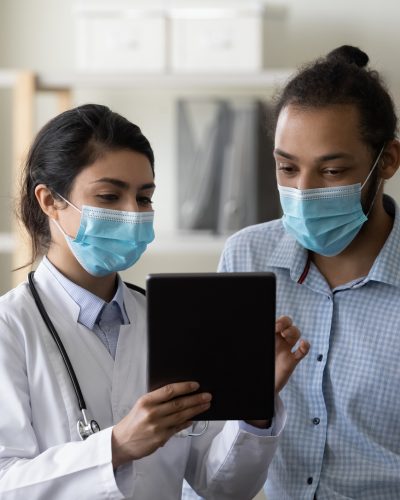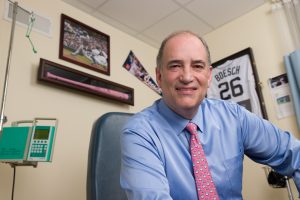Dr. Fitzgerald, who serves as RCCA’s chairperson, notes that RCCA’s 90+ cancer specialists regularly provide second opinions to people diagnosed with all types of solid tumors and blood-based malignancies. What’s more, he adds, his RCCA colleagues are very supportive when patients under their care want to obtain a second opinion from another physician.
“Some people are reluctant to seek a second opinion for fear of offending their oncologist. I am never bothered or insulted when one of my patients wants such a consultation. Their health, even their life, is at stake, and I want them to have the benefit of various expert perspectives, and to have confidence in their treatment plan rather than any lingering concerns,” Dr. Fitzgerald says. He adds that if a physician doesn’t support a patient’s request for a second opinion, it might be a sign to seek care elsewhere because “nobody has all the answers. If a doctor is offended when a patient seeks a second opinion, you have to question the reason for that.”
Dr. Shapira says, “Most doctors encourage consulting with another doctor regarding cancer management and are accustomed to having their patients involve another physician.” The board-certified medical oncologist and hematologist adds, “In fact, your doctor might recommend seeing another physician before you have the chance to broach the topic.”
The two cancer specialists add, however, that it is important to tell your primary oncologist that you are obtaining a second opinion because your doctor’s practice will need to provide copies of your records to the physician you will be consulting.
When to seek a second opinion
Dr. Fitzgerald notes that it can be particularly helpful to obtain a second opinion after you receive a pathology report but before you start treatment, so that you can benefit from different perspectives on the choice of initial therapy. However, he emphasizes, people can get a second opinion at any point during their cancer journey, including after undergoing treatment.
Dr. Shapira and Dr. Fitzgerald say that obtaining a second opinion can be valuable when:
- Tests to determine your cancer type, location, or stage show unclear or uncertain results;
- You’re uncomfortable with your initial diagnosis;
- You want to confirm your primary oncologist’s initial assessment so you can be reassured you’re on the right track;
- You think your oncologist might have overlooked something or made a mistake;
- You want to gain more knowledge about the benefits and risks of a proposed therapy, such as potential complications, adverse effects, toxicity, or effects on fertility;
- You can’t decide which of several available treatment options to choose;
- You want to learn whether there are better or newer treatment options;
- You want to find an alternative to a current treatment that’s causing complications or that isn’t effective;
- You’re hesitant when your oncologist suggests switching or adding to your current therapy;
- You’d like to know whether you might be a candidate for a clinical trial;
- You have a rare cancer;
- Your oncologist has limited experience with your type of cancer;
- You are dissatisfied with or had a negative experience with your doctor; and,
- You have difficulty communicating with or understanding your doctor, or think someone else can better explain your illness and its treatments to you.
When opinions differ
What if the doctor providing a second opinion disagrees with the primary oncologist’s diagnosis or treatment plan?
Your options include:
- Reviewing the consultant’s recommendations with the primary oncologist;
- Asking both doctors to explain how they interpreted the test results and came to their conclusions – and whether their recommendations are based on current clinical guidelines;
- Suggesting that the doctors discuss your case with each other to try to come to a consensus;
- Consulting with your primary care physician, who might be able to better interpret both oncologists’ opinions and help you with your decision-making; and,
- Getting a third opinion—after checking that your insurer will cover another visit.
Obtaining a second opinion from an RCCA specialist
If you want to obtain a second opinion from one of the 90+ cancer specialists at RCCA, call 1-844-346-7222 to schedule a consultation. You also should confirm that your health insurance plan covers second opinions, which most plans – including Medicare – do.
Before your visit, the RCCA staff will coordinate with your healthcare providers to have relevant medical records and test results forwarded to RCCA. An RCCA oncologist then will evaluate the documents and, if necessary, consult with a pathologist or radiologist to interpret test results.
During the visit, the RCCA oncologist generally will take a detailed medical history and perform a physical examination. In most cases, additional testing will not be needed. The RCCA oncologist will talk with you about your primary doctor’s diagnosis and treatment plan, and make his or her own recommendations. The RCCA oncologist will also send a copy of the consultation report to your doctor.
“Don’t hesitate to seek a second opinion at any time—or multiple times—during your cancer journey,” says Dr. Shapira. “Getting another opinion is a normal part of cancer management for both you and your oncologist. There is more than one way to solve a problem, and RCCA is here to help guide you through life-changing decisions and give you peace of mind.”
******
Drs. Fitzgerald and Shapira are among the 90+ cancer specialists who treat patients at more than 25 RCCA care centers in New Jersey, Connecticut, Maryland, and the Washington, DC, area. Those oncologists see more than 23,000 new patients each year and provide care to more than 225,000 established patients, collaborating closely with their patients’ other physicians. They offer patients the latest in cutting-edge treatments, including immunotherapies and targeted therapy, as well as access to a wide range of clinical trials. In addition to serving patients who have solid tumors, blood-based cancers, and benign blood disorders such as anemia, RCCA care centers also provide infusion services to people with a number of non-oncologic conditions—including multiple sclerosis, Crohn’s disease, asthma, and rheumatoid arthritis—who take intravenously-administered medications.
To learn more about RCCA, call 1-844-346-7222 or visit RCCA.com.
Resources on second opinions for cancer care decisions








